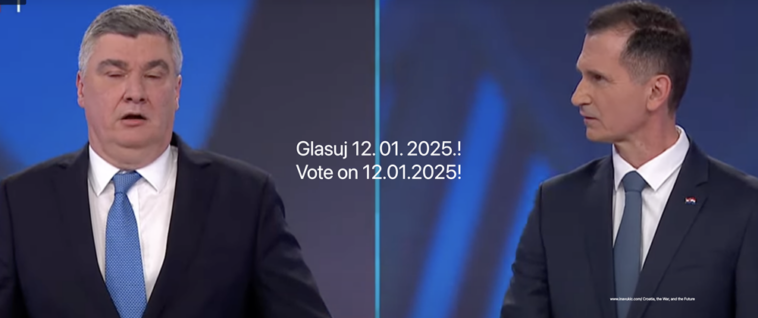“Just because you do not take an interest in politics doesn’t mean politics won’t take an interest in you,” said the wise Ancient Greek Pericles. Transposed into the imminent presidential elections for Croatia, due 12 January 2025, one cannot but conclude that those who do not vote or who vote with an invalid ballot paper are instrumental to Zoran Milanovic (current president) achieving an even greater advantage, against Dragan Primorac, for winning the round than what he had in the first round of voting on 29th December 2024. And yet it is safe to assume, based on social and other media outpours, Zoran Milanovic will continue taking Croatia deep into the oppressive and totalitarian former communist Yugoslavia apologist land. After all, he unashamedly states that independent is an accidental country and that he prefers Josip Broz Tito of communist Yugoslavia to Franjo Tudjman of independent Croatia. The problem is that voter turnout was below 50% in first round, and it will be even lower in the second if most eligible voters do not wake up.
Not voting is the real blight on democracy. Relatively recent research has shown that democracies are facing a significant backlash in many places, and authoritarian states are becoming more powerful as citizens fail to vote, thus growing a fertile ground for authoritarians with a following to win elections.
If majority of voters fail to vote and fail to be counted in valid election results electoral candidates thus have no fear from the electorate because they have been taught by non-voters and protest voters, they have nothing to fear from elections. It takes courage of all citizens to build a democracy in its true sense – to vote regardless of candidates on offer. There is always a best one on offer even when the candidates competing are to our personal dislike, the lesser of two evils as it has become to be known.
There a real problem in my book with people who with their preferred candidate (whether on the ballot paper or not) espouse democracy and then when it comes to elections they do not vote or intentionally make their ballot paper invalid! And yet elections are one of the critical wheels in the foundation of strong democracy, and they know it! How would the non-voters react if a candidate they love went for election? They would vote and urge others to do so. Nothing wrong here except the fact that democracy suffers with non-voters and protest voters always, whoever the candidates are.
Compromise is an essence of democracy, for a greater good. If one does not take part in democratic process one cannot fight for democracy. It would be morally wrong.
Protest voting (e.g. crossing all candidates’ names off, handwriting the name of your own candidate not on the list, not voting…) is in fact likely to harm the democratic process, potentially leading to the election of the candidate the majority of voters overall, and protest voters specifically, most dislike. So, Croatian patriots take note! Democracy functions by numbers of valid ballot papers only.
Let’s be real. Most people aren’t fans of any of the two candidates competing for presidency of Croatia on 12 January 2025. And most of the people who are fans of politicians as opposed to their country as a whole are at least a little crazy. So, let’s try an analogy I recently came across in my readings. A person walks into a restaurant, and they give him/her a menu. None of his/her favourite foods are on it. What does he/she order? He/she is probably not going to order their least favourite food. They’ll probably order something they find palatable. So, one should vote for the least objectionable candidate.
Another approach is to look at the big picture. One is not voting for a meal after all. One is not even voting for a person. They’re really voting for a system that takes their country’s national interests and, ideally, the values of the Homeland or Independence War, in case of Croatia, to the future or opens the door for them a bit wider. If one is unhappy with his/her choices, then the best decision one can make is to vote for the candidate or party who is most likely to help improve their personal choices next time. And that’s a very clear contrast. To me and many that candidate is Dragan Primorac and I shall be voting for him on 12c January 2025 because Zoran Milanovic is THE candidate who will make Croatia into a truly accidental state (according to him Croatia accidentally exited communism despite the 94% vote for independence in 1991, despite the rivers of blood spilt for democracy!) from which it will be impossible to come out for at least 50 years if he wins the second round.
If someone is dedicated to the notion and reality of an independent Croatia without communist Yugoslavia tags and can’t figure out which candidate will get them closer to their goal of having a viable candidate fully worthy of their vote in future elections, that someone is just not paying attention. To successfully transition from communism into democracy is a vicious battle on all fronts but to leave room for electoral manipulation, corruption and “party loyal voting only” by not voting is a “sin” I myself find difficult to swallow. I believe many others do too.
The unhappy voters, who choose not to vote or lodge an invalid ballot paper, really do have a preference – they like one of the candidates better than the other. So, while each individual unhappy voter wants to keep their hands clean and not vote, they would each like the other unhappy voters to step up and swing the outcome in favour of their preferred candidate.
The Bible and Parents teach the Golden Rule to kids – do unto others as you would have them do unto you – and most people do actually believe in it and try to act accordingly. In this case, following the Golden Rule means that if one is an unhappy voter and would like other unhappy voters to hold their noses and vote for the candidate, they least dislike, he/she should be willing to do the same thing himself/herself.
But not all unhappy voters think this way. Some are led astray by their intuition and choose to protest-vote even when their own values would indicate they shouldn’t.
One reason a person might still think a protest vote makes sense is because of the assumption that boycotting something they don’t like is an effective means of contributing to positive change.
A boycott against a person or organisation one has a problem with often makes good sense. But when one casts a vote, boycotting the viable candidate isn’t going to help. One of them is going to win whether one likes it or not. Boycotting here doesn’t help one achieve one’s goal of eliminating or improving something one doesn’t like. Precisely because the democracy of a country works with numbers, and numbers related to those whose ballot paper is valid for the counting of victory, not those who boycott.
Know that these presidential elections for Croatia are crucial for Croatia to keep transitioning from communism. If you are an eligible voter, please vote and consider voting for Dragan Primorac. I will. Croatian Democratic Union/HDZ party, although somewhat changed from the times of Franjo Tudjman who died late 1999, is still the political force that created and fought for an independent Croatia. Zoran Milanovic’s Social Democratic Party/SDP, former League of Communists, rejected an independent Croatia at the start and still, together with him on its political parameters, lives for the ideals of former communist Yugoslavia. Ina Vukic




